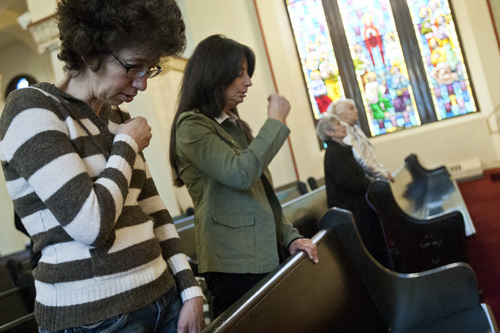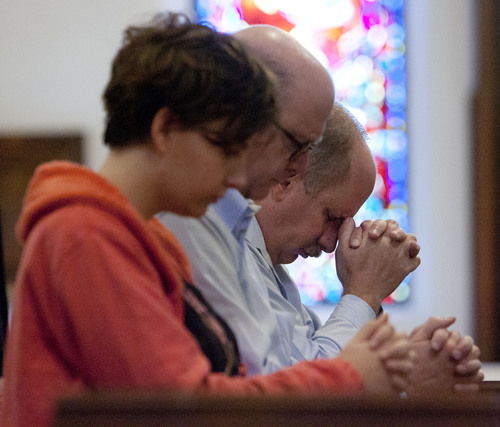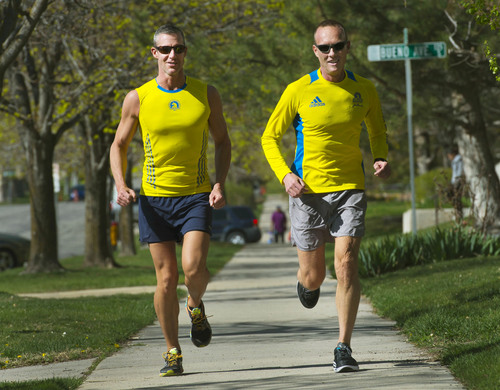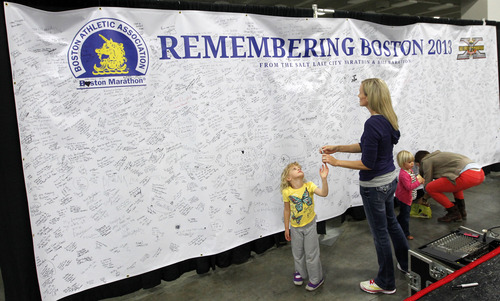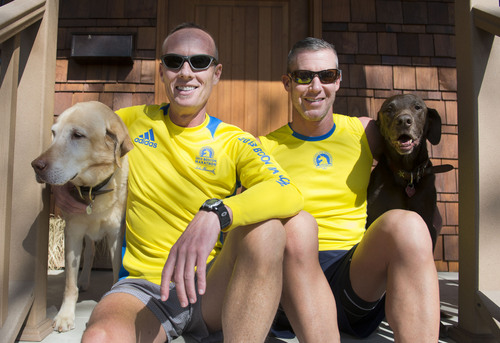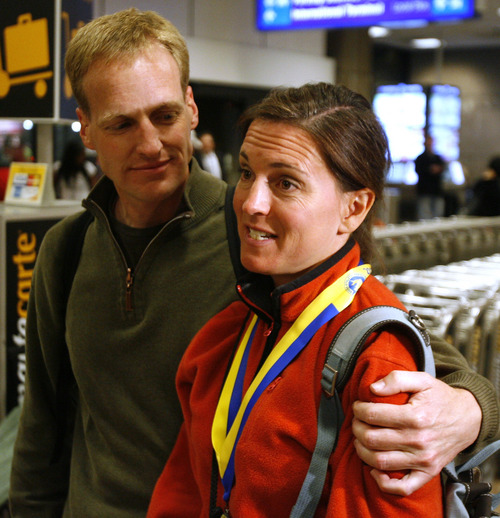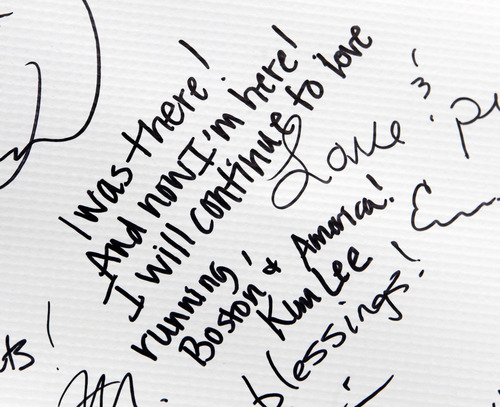This is an archived article that was published on sltrib.com in 2014, and information in the article may be outdated. It is provided only for personal research purposes and may not be reprinted.
Peggy Rose Boren sees the 2013 Boston Marathon medal on her dresser every day.
It reminds the St. George woman to take nothing for granted. She had crossed the finish line about six seconds before the first of two bombs exploded, plunging a perfect day into horror. The dual explosions killed three people and wounded hundreds.
"That moment, I'll never forget it. I'll never forget it," Boren said. What was supposed to be a momentous achievement — it was Boren's first time running in the famous marathon — is wrapped up in fear. Based upon finish times, about 50 Utah runners were in the vicinity of the finish line when the blast went off, either just finishing or nearing the race's conclusion. In all, there were 354 Utahns at the marathon.
Boston and its suburbs descended into a week of chaos amid a manhunt for two brothers accused of planning the attack. The older brother, Tamerlan Tsarnaev, 26, died and the younger, Dzhokhar Tsarnaev, 20, awaits trial.
Tuesday marks the first anniversary of the bombings and, on April 21, the Boston Marathon returns. So will Utah runners, to show their solidarity with those who lost life or limb that day, with their loved ones, with the people of Boston — and to stand up to fear.
"I know it's going to be very emotional when I cross the finish line. No doubt about it," Boren said. "I just want to conquer that fear that I have of that moment."
That moment was ruined for Cory Walker Maxfield, too.When she left her home in Holladay last year, she intended the 2013 marathon to be her third and final lap around Boston.
She was not far behind Boren when she got caught between both explosions. The course filled with smoke. The second blast went off as a race official tried to steer her to a side street.
"I couldn't see what was happening" through the crowds, Maxfield said in the days after the bombs. "People were screaming, there was smoke, and suddenly everybody that had Boston Marathon volunteer jackets was rushing toward these two areas, tearing down barricades, and it was just pandemonium."
Amid the chaos, she could not see those who had been injured. Startled and unsure where to go or what to do, Maxfield kept doing what marathoners do: run. She crossed the finish line 4:09:53 after the race's start.
For a month after she returned to Utah, everyone was asking her for her story. She told it again and again, pointing to herself in a Boston Globe photograph of the mayhem.
"At the time, a few weeks after the marathon, I took the time to write a journal entry to myself while the experience was still fresh in my mind," Maxfield said. After giving the prospect more thought, she made up her mind to run it again. She does not want to let "those brothers and their evil act" ruin what should be a great event, full of accomplishment and camaraderie.
It's the same defiance that fuels Stephen Clark's return to the race.
Clark, a Salt Lake City attorney, had completed the marathon and, normally, would have waited at the finish line for his husband, who was lagging behind. But, contrary to the two runners' common practice, they agreed to meet up at their nearby hotel.
So while Clark put the finish line behind him, his husband was running toward it — and saw the first bomb go off.
"It was an odd twist of fate," Clark said. "Both of us could have been very close."
After the surreal experience of watching Boston turn into part ghost town, part war zone, Clark returned to Utah and a normal life. But he kept the marathon jersey. And he kept running.
When Clark goes for a run through Memory Grove or City Creek, he slips on the jersey.
"The days I wear that shirt, I'm very mindful of the response of other runners, obviously," Clark said. They give him shout-outs, like "Boston Strong," which became a defiant slogan against terror in the wake of the bombings — and Clark and his husband intend to take that defiance to the marathon next week. "We're determined to go back and make a point: Life goes on."
It did for Boren.
Running is not only Boren's years-long passion, it's therapy. Along with her faith and talking about that dark day with friends and family, running helped her deal with the trauma.
She made a lot of progress, but when the prospect of returning to Boston first arose, she was not going to go.
"I thought, 'I've done Boston, that was my goal,' and I just thought, 'One time in someone's life should be enough.' "
Complicating things, she found a YouTube video that blamed her, by name, for the bombing, based on some conspiracy theory, Boren said. YouTube has since taken the video down after Boren and her husband complained, she said.
"It was so stupid. I was so disturbed by it," Boren said. "… It made me so angry."
But the she gave the possibility of returning to Boston more thought, learning that she has a lot of friends who are going. Her husband, who cheered for her from the sidelines, wanted to go back, too.
So supporting one another, they mean to keep running and not let fear rule the day.
"I've been running since probably college, years and years ago," Boren said. "I love running."
She enjoys the accomplishment she finds in it, and it reminds her that she has her health. In the past six months, she's seen her husband — a man who finished three marathons with her — start running once more after battling cancer and enduring open heart surgery. "I'll never give it up … I'll never stop."
Twitter: @mikeypanda —
Salt Lake Running Co. is staging a run on April 21 to raise money for the victims of the bombing and as a sign of solidarity with the people of Boston. The run begins 7 p.m. at 2454 S. 700 East. For more information, visit saltlakerunningco.com.


